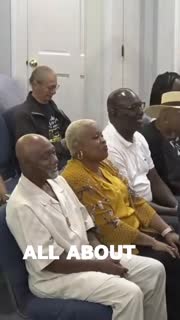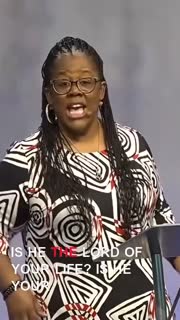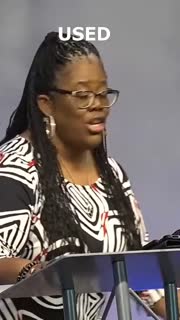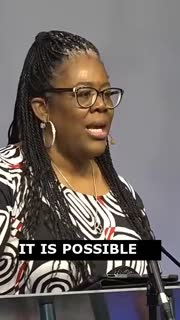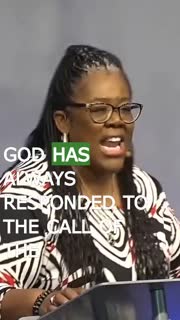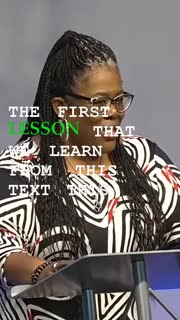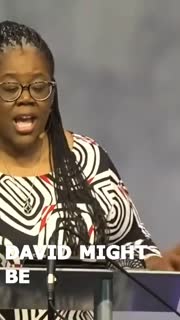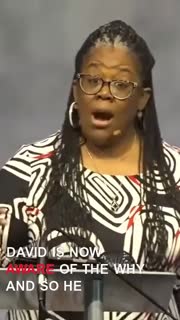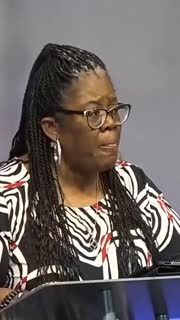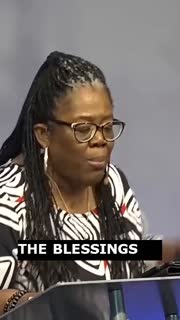Rizpah's Resilience: Turning Pain into Advocacy
Devotional
Sermon Summary
Bible Study Guide
Sermon Clips
### Quotes for Outreach
1. "Listen, it's all about enjoying God. Enjoying the love of our brothers and our sisters. And just celebrating. We're celebrating life. Come on. God said I would have that you would have life and have it more abundantly. Can we celebrate God for abundant life today? Amen, amen." [35:13] (19 seconds)
2. "Is he the Lord of your life? Is he your keeper? Is he your provider? Is he your protector? Is he wonderful? Hallelujah My God is wonderful Wonderful Hallelujah Hallelujah We bless the name of the Lord Because he is good Matter of fact he is great And he is greatly to be praised I wonder if anybody came to praise him today Did anybody come to worship him today? Hallelujah Hallelujah Hallelujah Hallelujah" [44:33] (47 seconds)
3. "God used something that they could not ignore, something that affected the entire nation, to expose what was the condition of the country. Y'all remember back to the spring of 2020? Y'all remember what we were doing in the spring of 2020? It was the COVID pandemic. Y'all ain't forgot already. Well, in the midst of the spring of 2020, y'all remember when a police officer named Derek Chauvin kneeled on the neck of George Floyd? Remember that while the world was shut down, that everybody saw the footage and that the consciousness of the nation was raised." [58:28] (37 seconds)
4. "It is possible to pivot your pain into a position of power. So these boys, when Rizba's sons, the five sons of Merib and the two sons of Rizba, when they are lynched and left hanging for the world to see, their mother Rizba says she takes a sackcloth and she goes and she puts it on a rock to make a vigil to watch over the bodies of the boys. She lacked the power to prevent David from turning her boys over for execution, but she would now make sure that no further harm comes to her sons." [01:03:31] (42 seconds)
5. "God has always responded to the call of the downtrodden and the oppressed. God was on the side of Israel, the oppressed Israel, not the pharaoh of Egypt. God heard their cries and God intervened through plagues and miracles, and it is God who led the oppressed people to freedom. God has always responded to the call of the downtrodden and the oppressed." [01:16:26] (5 seconds)
### Quotes for Members
1. "The first lesson that we learn from this text this morning is that unaddressed sin has consequences. Unaddressed sin has consequences. You all know that the famine that occurred, we told you during David's reign, was not because of anything that David did. The famine was happening because of the result of a covenant that was broken by Saul. Saul's decision to put military might, economic security, political power, and the reputation of Israel ahead of what God had ordained has now caused a desperate situation in this country." [54:25] (41 seconds)
2. "David might be a man after God's own heart, but he cannot erase the past. And the effects of the decisions of the past are still being felt in his time. Now we can see how this works. We know how this works on an individual level. How many of you have to admit that some of the stuff you are dealing with today is a result of the decisions you made yesterday? Oh come on, I've got more amens than that. If I had listened to God then, I wouldn't be dealing with this now." [55:25] (32 seconds)
3. "David is now aware of the why, and so he sets about to make a change. He asked the Gibeonites what he could do to make things right with them, and they basically said, 'Listen, there ain't no amount of money that's going to fix this.' I want to tell them, but you can try. But that's not what they said. They said there's no amount of money that would fix this, but we would like a punishment. And at that time, the punishment is supposed to be in alignment with the crime." [01:00:28] (35 seconds)
4. "David allowed those bodies to hang. He permitted this tragedy to go on, and of course they wanted it, but David could have changed it. So it wasn't until he heard about Rizpah, it wasn't until he realized that folks were talking about what Rizpah was doing, it wasn't until her actions and her advocacy, it wasn't until she began to make—she didn't make noise, but people were making noise." [01:11:04] (33 seconds)
5. "The blessings of God did not return until he did right by this woman who was wrong. The blessings of God did not return until there was an acknowledgment of past wrongs. The justice of blessings of God did not return until not only was there an acknowledgment of past wrongs, but there was a repaying of past wrongs. It was not just acknowledgment, but some kind of reparation went on here, a writing of the wrongs." [01:14:31] (32 seconds)
Ask a question about this sermon
1. "Listen, it's all about enjoying God. Enjoying the love of our brothers and our sisters. And just celebrating. We're celebrating life. Come on. God said I would have that you would have life and have it more abundantly. Can we celebrate God for abundant life today? Amen, amen." [35:13] (19 seconds)
2. "Is he the Lord of your life? Is he your keeper? Is he your provider? Is he your protector? Is he wonderful? Hallelujah My God is wonderful Wonderful Hallelujah Hallelujah We bless the name of the Lord Because he is good Matter of fact he is great And he is greatly to be praised I wonder if anybody came to praise him today Did anybody come to worship him today? Hallelujah Hallelujah Hallelujah Hallelujah" [44:33] (47 seconds)
3. "God used something that they could not ignore, something that affected the entire nation, to expose what was the condition of the country. Y'all remember back to the spring of 2020? Y'all remember what we were doing in the spring of 2020? It was the COVID pandemic. Y'all ain't forgot already. Well, in the midst of the spring of 2020, y'all remember when a police officer named Derek Chauvin kneeled on the neck of George Floyd? Remember that while the world was shut down, that everybody saw the footage and that the consciousness of the nation was raised." [58:28] (37 seconds)
4. "It is possible to pivot your pain into a position of power. So these boys, when Rizba's sons, the five sons of Merib and the two sons of Rizba, when they are lynched and left hanging for the world to see, their mother Rizba says she takes a sackcloth and she goes and she puts it on a rock to make a vigil to watch over the bodies of the boys. She lacked the power to prevent David from turning her boys over for execution, but she would now make sure that no further harm comes to her sons." [01:03:31] (42 seconds)
5. "God has always responded to the call of the downtrodden and the oppressed. God was on the side of Israel, the oppressed Israel, not the pharaoh of Egypt. God heard their cries and God intervened through plagues and miracles, and it is God who led the oppressed people to freedom. God has always responded to the call of the downtrodden and the oppressed." [01:16:26] (5 seconds)
### Quotes for Members
1. "The first lesson that we learn from this text this morning is that unaddressed sin has consequences. Unaddressed sin has consequences. You all know that the famine that occurred, we told you during David's reign, was not because of anything that David did. The famine was happening because of the result of a covenant that was broken by Saul. Saul's decision to put military might, economic security, political power, and the reputation of Israel ahead of what God had ordained has now caused a desperate situation in this country." [54:25] (41 seconds)
2. "David might be a man after God's own heart, but he cannot erase the past. And the effects of the decisions of the past are still being felt in his time. Now we can see how this works. We know how this works on an individual level. How many of you have to admit that some of the stuff you are dealing with today is a result of the decisions you made yesterday? Oh come on, I've got more amens than that. If I had listened to God then, I wouldn't be dealing with this now." [55:25] (32 seconds)
3. "David is now aware of the why, and so he sets about to make a change. He asked the Gibeonites what he could do to make things right with them, and they basically said, 'Listen, there ain't no amount of money that's going to fix this.' I want to tell them, but you can try. But that's not what they said. They said there's no amount of money that would fix this, but we would like a punishment. And at that time, the punishment is supposed to be in alignment with the crime." [01:00:28] (35 seconds)
4. "David allowed those bodies to hang. He permitted this tragedy to go on, and of course they wanted it, but David could have changed it. So it wasn't until he heard about Rizpah, it wasn't until he realized that folks were talking about what Rizpah was doing, it wasn't until her actions and her advocacy, it wasn't until she began to make—she didn't make noise, but people were making noise." [01:11:04] (33 seconds)
5. "The blessings of God did not return until he did right by this woman who was wrong. The blessings of God did not return until there was an acknowledgment of past wrongs. The justice of blessings of God did not return until not only was there an acknowledgment of past wrongs, but there was a repaying of past wrongs. It was not just acknowledgment, but some kind of reparation went on here, a writing of the wrongs." [01:14:31] (32 seconds)
